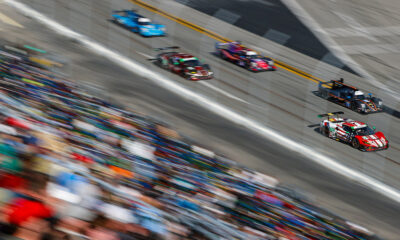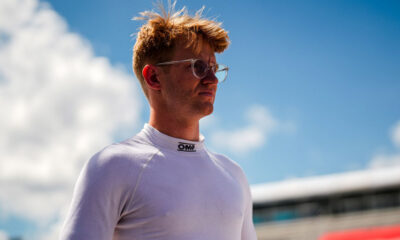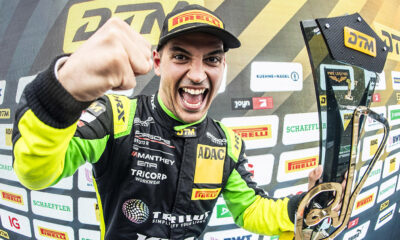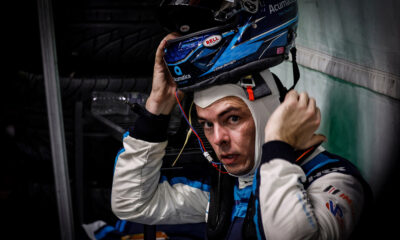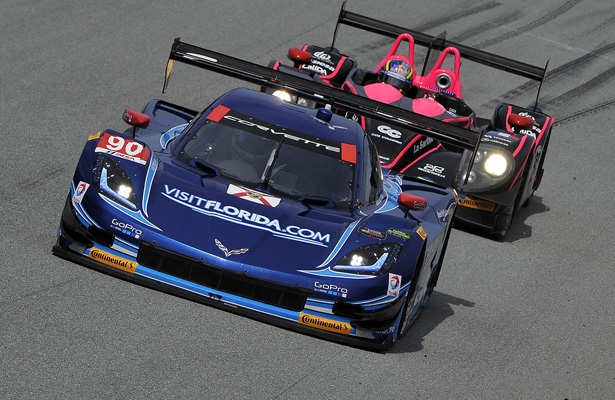
Photo: IMSA
IMSA’s Scot Elkins stands by the current Balance of Performance levels between the Daytona Prototype and P2 cars in the wake of last weekend’s Sahlen’s Six Hours of The Glen.
The third round of the Tequila Patron North American Endurance Cup saw the No. 90 Spirit of Daytona Corvette DP of Richard Wesbrook and Michael Valiante take victory following Westbrook’s late-race pass around the then-leading No. 42 OAK Racing Morgan-Nissan of Alex Brundle on the second-to-final restart with 12 minutes to go.
Brundle’s P2 car, which was slightly held up by the lapped No. 9 Action Express Racing Corvette DP, was unable to respond due to its power deficit to the heavier tube-framed prototype. DP cars have won five of the six Prototypes races to date this season.
“I find it interesting the way it seems like everyone wants to judge the BoP on one lap of a six-hour race. I honestly don’t think it’s fair,” Elkins told Sportscar365.
“Even in talking with the OAK Racing guys, their biggest issue and complaint was that the 9 car was in their way. It wasn’t that they absolutely, 100 percent didn’t have a chance on a one-lap shootout; it was that they had other lap-down traffic in their way that was causing a little bit of a problem.”
BoP has been one of the major talking points this season, although Elkins firmly believes they’ve gotten it close, especially given the significant differences between the two platforms.
IMSA’s VP of competition and technical regulations said there was only 0.1 percentage difference in the combined top 20 percent quickest lap times between the No. 90 Corvette DP and No. 42 Morgan-Nissan in the race.
Each car, however, excels in different areas of the track, with the DP reportedly having up to a 9 mph advantage in straight-line speed at Watkins Glen.
“It’s not perfect,” Elkins said. “We’re still looking at apples and oranges here. Nobody had any expectation that it would be perfect. Can we make it a little bit closer? Yeah, of course we can. But I don’t really feel it’s a disaster that some folks are making it out to be.”
Elkins doesn’t anticipate any significant performance adjustments between the two prototype platforms heading into next weekend’s Mobil 1 Sportscar Grand Prix at Canadian Tire Motorsport Park.
Instead, Elkins said a possible BoP change could be on tap within the DP camp, in order to close the performance gap between the Chevy and Ford-powered prototypes.
“I don’t care who you are, the ACO, the FIA or us, we don’t ever do Adjustment of Performance based on one lap [performance]. I just don’t feel like that’s a fair comparison.
“If we base it on the last lap, we’d have a lot of work to do but we have six hours of data to look at it. I don’t know how much we’ll have to change yet.”
Watkins Glen also marked the first full-grid race since the Rolex 24 at Daytona and Twelve Hours of Sebring, which were overshadowed in controversy from a ruling reversal and officiating errors.
Sunday’s race ran without a hitch, with Elkins crediting new procedures and equipment in Race Control for helping make the crucial improvement.
“Everybody in the journalistic world said this was a critical turning point for us and I’d like to think that everybody would agree that we passed the test of having all four classes back together,” he said.
“To get back to having all four classes on track at the same time, I think we’ve been able to give ourselves a little bit of a boost in terms of the races we’ve had with the split classes and work on these new procedures and get everything going so we’re in the position we wanted to be going into Watkins Glen.”
One of the new procedures implemented has been a review process which allows teams to visit Race Control to look over evidence before serving a penalty.
“Our team in Race Control is no different than any of the race teams,” Elkins added. “When you have a good event you feel better and the confidence level goes up and the chemistry between everybody works better and you feel like you’re on a streak.
“Getting through this weekend was definitely one of those, where we’ve got a high level of confidence heading into the next event, feeling very good about the changes and knowing that the things we did made a difference. That makes everybody feel better, whether it’s the staff or our competitors.”




















